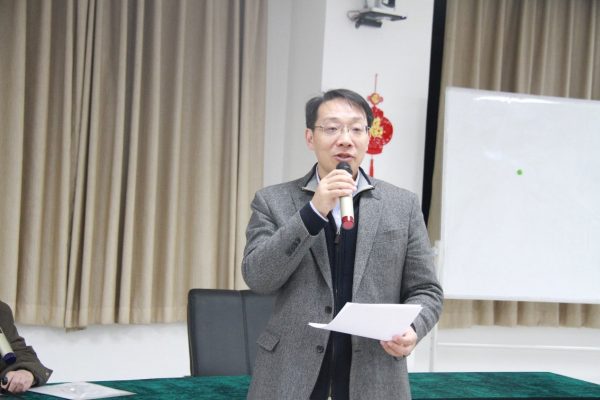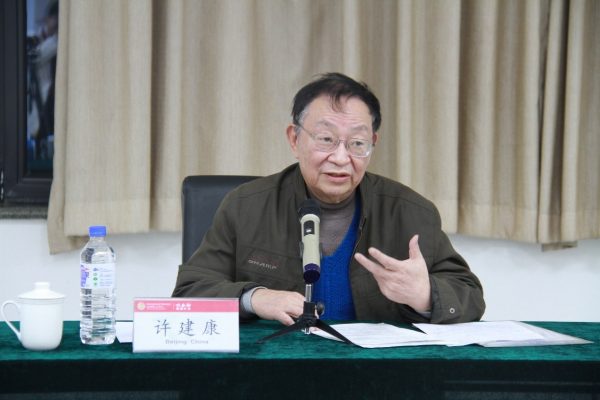Macro-Finance Salon (No. 105): The Rise and Fall of Great Powers and Long Period of Hegemony
2018-10-31 IMI Professor Xu Jiankang analyzed the rise and fall of great powers and long period of hegemony in his speech. He also discussed four important issues including Thucydides's Trap, the world’s fundamental contradiction, the postwar governance of the US hegemony and the rise of protectionism by Trump. He held that, the situation in the US can now be epitomized by three major trends. Western countries attribute the hegemonic period to the fight for hegemony between emerging powers and existing powers. There is no world government. The economy and politics are interacting everyday, so we do need leaders in the world system. The trade war doesn’t mean China is fighting for hegemony against the US, rather China is seeking to change the unreasonable internationalization and change the hegemony of imperialism. The China-US trade war not only reflects the globalization of productivity, but also the globalization of capital. Therefore, we need to research the China-US trade war from a global perspective. After reviewing the US hegemonism and the China-US trade war, Professor Xu put forward that, there existed two fundamental contradictions in the society development, which were productivity and production relationship, and the economic foundation and the superstructure. He considered that we should use the law of value to analyze international trade and we should also focus on the flow of capital, because it has a bearing on revolution. When talking about the period of hegemony, Professor Xu believed that the long wave theory was the basic of long period of hegemony. At the heyday of hegemony, free trade is actually monopolized by hegemonic powers. Once hegemonic powers lost their status, we can see the spread of technology and emerging powers, and therefore we enter the descendant phase of long wave. In the heyday of hegemony, the world is with orders and focus on development. Historically, when the hegemony falls into a decline and the multi-polarization is on the rise, we can see the uprising of protectionism and competitions for interests. The hegemonic governance of the US is actually protectionism initiated by Trump, which prioritize the interest of the US.
Professor Xu Jiankang analyzed the rise and fall of great powers and long period of hegemony in his speech. He also discussed four important issues including Thucydides's Trap, the world’s fundamental contradiction, the postwar governance of the US hegemony and the rise of protectionism by Trump. He held that, the situation in the US can now be epitomized by three major trends. Western countries attribute the hegemonic period to the fight for hegemony between emerging powers and existing powers. There is no world government. The economy and politics are interacting everyday, so we do need leaders in the world system. The trade war doesn’t mean China is fighting for hegemony against the US, rather China is seeking to change the unreasonable internationalization and change the hegemony of imperialism. The China-US trade war not only reflects the globalization of productivity, but also the globalization of capital. Therefore, we need to research the China-US trade war from a global perspective. After reviewing the US hegemonism and the China-US trade war, Professor Xu put forward that, there existed two fundamental contradictions in the society development, which were productivity and production relationship, and the economic foundation and the superstructure. He considered that we should use the law of value to analyze international trade and we should also focus on the flow of capital, because it has a bearing on revolution. When talking about the period of hegemony, Professor Xu believed that the long wave theory was the basic of long period of hegemony. At the heyday of hegemony, free trade is actually monopolized by hegemonic powers. Once hegemonic powers lost their status, we can see the spread of technology and emerging powers, and therefore we enter the descendant phase of long wave. In the heyday of hegemony, the world is with orders and focus on development. Historically, when the hegemony falls into a decline and the multi-polarization is on the rise, we can see the uprising of protectionism and competitions for interests. The hegemonic governance of the US is actually protectionism initiated by Trump, which prioritize the interest of the US.
 When giving remarks, Professor Li Xiao mentioned, the China-US trade war is actually a war of system and will force China to reform. China’s future development mainly lies on the internal reform. In the future, China will cope with challenges posed by the US system and make appropriate compromise, which are our great progress in system. Professor Ding Zhijie considered, the fall of US dollar’s status as international currency or its technical advantages are no longer the trigger of China-US trade friction. China should cope with it from the perspective of the US, rather than turning it into the war of words. Professor Xie Fusheng pointed out, it was a favorable time for China’s development. First, we should rely on innovation and establish development platform of key components. Second, the merger and acquisition of upstream firms can help solve the capacity problem. Meanwhile, by improving the environment of rural areas, we can rejuvenate the rural areas.
In the Q&A session, questions about hegemony period, long wave theory and China-US friction were all answered by speakers.
The Macro-Finance Salon is a high-level academic salon set up jointly by the Monetary Institute of International Monetary Fund and the Monetary and Financial Department of the School of Finance of Renmin University of China. It is divided into four categories: “policy experts”, “academic masters”, “industry elites” and “young scholars”. Based on Chinese practice and keeping up with the international developments, the Salon is devoted to promoting the development of “big finance” in the new era and deepening the research on the theory, policy and strategy of “big finance” to build a platform for academic exchange of high level, specialization and openness. The concept of “big finance”, which is theoretically originated from the combination of macro-micro-finance theory advocated by Professor HUANG Da, is conceptually originated from the systemic thinking of the financial and real economy as an indivisible organic whole. CHEN Yulu, vice president of the People’s Bank of China, systematically demonstrated the basic connotation and methodology of the proposition of “big finance” in the “Outline for Macro- Finance”. In order to comprehensively build a “macro-finance” that is conducive to promoting long-term economic growth and enhancing national competitiveness, system frameworks have to have theoretical and empirical basis.
When giving remarks, Professor Li Xiao mentioned, the China-US trade war is actually a war of system and will force China to reform. China’s future development mainly lies on the internal reform. In the future, China will cope with challenges posed by the US system and make appropriate compromise, which are our great progress in system. Professor Ding Zhijie considered, the fall of US dollar’s status as international currency or its technical advantages are no longer the trigger of China-US trade friction. China should cope with it from the perspective of the US, rather than turning it into the war of words. Professor Xie Fusheng pointed out, it was a favorable time for China’s development. First, we should rely on innovation and establish development platform of key components. Second, the merger and acquisition of upstream firms can help solve the capacity problem. Meanwhile, by improving the environment of rural areas, we can rejuvenate the rural areas.
In the Q&A session, questions about hegemony period, long wave theory and China-US friction were all answered by speakers.
The Macro-Finance Salon is a high-level academic salon set up jointly by the Monetary Institute of International Monetary Fund and the Monetary and Financial Department of the School of Finance of Renmin University of China. It is divided into four categories: “policy experts”, “academic masters”, “industry elites” and “young scholars”. Based on Chinese practice and keeping up with the international developments, the Salon is devoted to promoting the development of “big finance” in the new era and deepening the research on the theory, policy and strategy of “big finance” to build a platform for academic exchange of high level, specialization and openness. The concept of “big finance”, which is theoretically originated from the combination of macro-micro-finance theory advocated by Professor HUANG Da, is conceptually originated from the systemic thinking of the financial and real economy as an indivisible organic whole. CHEN Yulu, vice president of the People’s Bank of China, systematically demonstrated the basic connotation and methodology of the proposition of “big finance” in the “Outline for Macro- Finance”. In order to comprehensively build a “macro-finance” that is conducive to promoting long-term economic growth and enhancing national competitiveness, system frameworks have to have theoretical and empirical basis.
